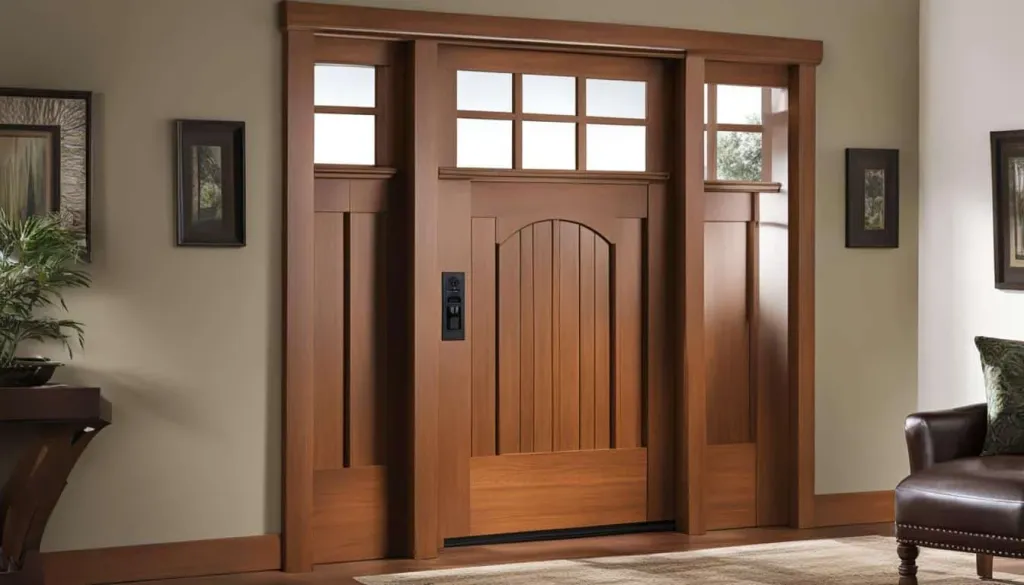Craftsman-style architecture has long been admired for its timeless appeal and classic, clean lines. One key feature that embodies this style is the Craftsman Door Trim. Whether you’re looking to remodel your home or just appreciate the art of beautiful woodworking, understanding craftsman door trim is essential. In this detailed guide, we’ll dive into what makes craftsman door trim unique, its history, how to choose the right style for your home, and even how to install it yourself.
What Is Craftsman Door Trim?
Craftsman door trim refers to the distinct style of moldings that frame a doorway, showcasing a simple yet elegant look. This type of trim is known for its clean, straight lines and minimal ornamentation. Unlike highly ornate Victorian trims, craftsman door trim emphasizes function and form over intricate detailing. The result? A sophisticated, sturdy, and visually appealing door frame that enhances the overall aesthetic of your space.
Key Characteristics of Craftsman Door Trim
So, what sets craftsman door trim apart from other types of moldings? Here are some defining features:
- Clean, Simple Lines: Craftsman trim is known for its straight, geometric lines that contribute to its clean and uncomplicated look.
- Wide Casing: The trim surrounding the door is generally wider than standard door trim, which adds to its bold appearance.
- Layered Top: Craftsman door trims often feature a layered header at the top, creating an eye-catching focal point.
- No Frills: Unlike more ornate trim styles, craftsman trim avoids heavy embellishments and intricate carvings.
These features make craftsman door trim perfect for homeowners who appreciate a combination of elegance and simplicity.
The History Behind Craftsman Door Trim
The craftsman style emerged in the early 20th century as part of the broader Arts and Crafts movement, which originated in England in response to the Industrial Revolution. This movement aimed to revive traditional craftsmanship and reject overly elaborate Victorian designs. When it crossed over to the United States, it gained popularity thanks to architects like Gustav Stickley and the influential designs of the Greene brothers.
Craftsman door became a popular choice in bungalows and mission-style homes because of its robust yet minimalistic look. These trims were often handcrafted, showcasing the quality and attention to detail that the Arts and Crafts movement was all about. Today, craftsman door trim remains a symbol of enduring quality and architectural elegance.
Why Choose Craftsman Door Trim for Your Home?
Wondering if craftsman door trim is the right fit for your home? Here are some reasons why many homeowners choose this classic design:
Timeless Aesthetic
Craftsman door trim adds a touch of elegance to any home without appearing too formal or over-the-top. Its simple, bold lines complement a wide range of interior designs, from rustic to modern.
Increased Home Value
Investing in quality craftsman door trim can enhance the perceived value of your home. Potential buyers often appreciate well-thought-out architectural details, and craftsman trims are a subtle yet powerful way to make a good impression.
Durability
Built with solid, high-quality wood like oak, pine, or maple, craftsman trims are designed to last. This type of trim withstands wear and tear better than cheaper, thinner moldings, making it a great long-term investment.
Choosing the Right Wood for Your Craftsman Door Trim
The type of wood you choose for your craftsman door trim plays a significant role in its final appearance and durability. Here’s a table to help you choose the best wood for your project:
| Type of Wood | Durability | Appearance | Cost |
|---|---|---|---|
| Oak | High | Strong grain, rich color | $$$ |
| Maple | High | Smooth grain, light color | $$ |
| Pine | Medium | Knots and rustic charm | $ |
| Cedar | Medium | Natural resistance to rot | $$ |
| MDF | Low | Uniform surface, affordable | $ |
Choosing the right type of wood depends on your budget and the aesthetic you’re going for. For example, if you want a more rustic look, pine may be the way to go, while oak is a premium choice for a polished, upscale appearance.
Components of a Craftsman Door Trim
A well-crafted craftsman door trim includes several key components:
- Top Casing (Header): This is often the most decorative part, adding height and visual interest to the trim.
- Side Casings: The vertical pieces that frame the door.
- Apron or Bottom Piece: Sometimes, a small piece of trim is added beneath the top casing for an extra touch of detail.
Tips for Enhancing the Look of Your Craftsman Door Trim
- Add Crown Molding: Incorporating a small strip of crown molding on the top casing can add depth and a finished look.
- Use Contrasting Paint or Stain: Painting the trim a color that contrasts with your wall can make it pop.
- Include a Backband: A backband is an additional layer of molding that wraps around the casing, adding more depth.
How to Install Craftsman Door Trim
Installing craftsman door trim can be a manageable DIY project if you have basic carpentry skills. Here’s a step-by-step guide:
Materials Needed:
- Wood for trim (cut to size)
- Measuring tape
- Saw (preferably a miter saw)
- Wood glue
- Nails and hammer or nail gun
- Sandpaper
- Paint or stain (optional)
Installation Steps:
- Measure and Cut: Measure the height and width of your door frame. Cut your wood pieces accordingly.
- Attach the Side Casings: Start by attaching the vertical side casings. Use a level to ensure they’re straight, then secure them with wood glue and nails.
- Install the Top Casing: Place the top casing above the side pieces, ensuring it’s centered. Attach with nails and glue.
- Sand and Finish: Sand down any rough edges, then apply paint or stain if desired.
Maintenance and Care
Proper maintenance will keep your craftsman door trim looking beautiful for years. Here’s how:
- Regular Dusting: Wipe down the trim with a soft, damp cloth to remove dust and debris.
- Polishing: For stained wood, use a wood polish to keep it shiny and protected.
- Touch-Up Paint: If the paint chips or the finish dulls, touch it up to keep your trim looking fresh.
Bringing Craftsman Charm to Any Home
Even if your home doesn’t follow the traditional craftsman style, adding craftsman door trim can instantly elevate your interior. Its simplicity allows it to blend seamlessly with modern, farmhouse, and transitional designs, providing versatility that few other trim styles offer.
Conclusion
From its rich history to its functional design, craftsman door trim is a beautiful and practical addition to any home. It stands out for its clean lines, high-quality craftsmanship, and timeless appeal. Whether you’re looking to add value to your property, give your home a subtle yet sophisticated touch, or simply appreciate the art of traditional woodworking, craftsman door trim is a choice that’s hard to beat.
With proper installation and care, craftsman door trim can enhance your space and last for generations. So, why not bring a touch of elegance and craftsmanship into your home today?








